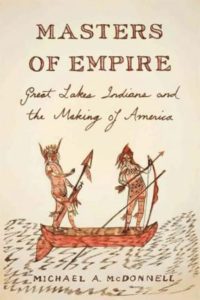Book Review: Masters of Empire: Great Lakes Indians and the Making of America
Masters of Empire is a masterful work sure to annoy many scholars of early America. Instead of following the tried and ‘true’ narrative of Odawa/Anishiaanbeg dependence on incoming European nations, McDonnell casts the European empires as dependents of the Odawa and other Indigenous nations in the pays d’en haut. The Odawa were able for more than two centuries to play pivotal roles in the fur trade and imperial conflicts, thereby placing this nation at the centre of North American history.
Throughout Masters of Empire, McDonnell provides compelling evidence that the Odawa and their kin networks pursued their own interests. Rather than overly weighing their involvement with Europeans, McDonnell shows that the Odawa often had geopolitical concerns that did not include Europeans. For instance, in the late 1600s the Odawa made peace with the Dakota so they could concentrate on their war with the Iroquois. In terms of their relations with the French and English, McDonnell has the Odawa forcing the Europeans to accede to Indigenous demands.
McDonnell also demonstrates the importance of the Odawa by claiming that they started the French-Indian War of 1754-63. For many scholars, the 1752 raid on a Miami village of Pickawillany was orchestrated by the French to eliminate the British trades in the Ohio Valley. McDonnell convincingly argues that the entire raid was undertaken by the Odawa with the complicit support of the Haundenosaunee, Miami, and others in the region to ensure inter-tribal peace. He also notes that George Washington’s 1754 adventures in the Ohio region, generally viewed as the first conflict in the French-Indian Wars, was in retaliation for the 1752 raid. Hence, the Odawa in 1752 set off a series of events that eventually led to the American Revolution. This is a magnificent claim and illustration of the importance of the Odawa and pays d’en haut in North America.
McDonnell is not telling a history of defeat, dependence, subjugation, and silence; rather, he casts the Odawa as successful Masters of Empire. McDonnell’s work is a history of resourcefulness, politics, war, peace, and mastery of empire as pursued by the Odawa of Michillimackinac. It is original in its focus and narrative, and something that every student of Indigenous-Settlers relations and Early America must take note of.
Michael A. McDonnell, Masters of Empire: Great Lakes Indians and the Making of America. New York: Hill and Wang, 2015.



